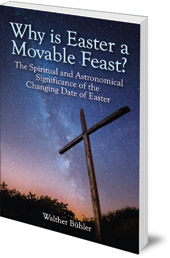Why Is Easter a Movable Feast?
The Spiritual and Astronomical Significance of the Changing Date of Easter
Quick Look
- Addresses the current public discussion around fixing the date of Easter
- Explores why the rhythm of Easter is important, linking spiritual and human health implications
- A perspective combining medicine and theology
This fascinating book explores the significance of keeping Easter as a movable festival.
Description
The date of Easter is different every year. Not only does the date change because Easter is always on a Sunday, but also because it's always the date of the first full moon after the spring equinox. That means it can be anytime between March 22 and April 25.
Some people have argued that we should fix the date of Easter each year -- to the first or second Sunday in April -- so that school term dates, for example, could be consistent and predictable.
This book explores the significance of keeping Easter as a movable festival. Based on his research into the importance of rhythm for human health and wellbeing, physician Walter Bühler demonstrates a profound connection between the complex rhythms of the sun and the moon and the historical events of Christ's death and resurrection.
He argues that, in the same way the rhythm of day and night is reflected in waking and sleeping, celebrating Easter on a different date each year reflects the deep connection and harmony between human beings and the rhythms of the cosmos.
Reviews
'Bühler's book is short and easily read. […] He provides however, a firm foundation from which to understand the temporal aspect of Easter, and leaves us to develop our own understanding of the event further. […] The alterable date of Easter reflects the organic nature of the universe, and our part in it.'
--Revd. Luke Barr, Aberdeen
‘Walter Bühler’s book does not attempt any theology. But it is concerned with understanding the temporal aspect of Easter. For this he provides a firm foundation, and leaves us to develop our own understanding of the event further. He wishes to draw attention to the significance of the fact that Easter does not possess temporal rigidity.’
-- Revd. Luke Barr for Perspectives
'the question of whether or not the date of Easter should be fixed has been raised by the Coptic Pope Tawadros II, after discussions with Pope Francis and the Ecumenical Patriarch. The publication is therefore timely.'
--Lambeth Palace
'It is perhaps typical of our own age to emphasise practicality over symbolism and spirituality, but this book redresses the balance.'
--Scientific and Medical Network Review
Author
Walther Bühler (1913–95) was a German physician who specialised in Geothean research. He studied medicine and did research into the changing ratio of male and female births at different phases of the moon. He was the founder of the Paracelsus Clinic in southern Germany. He lectured widely and was known for being able to explain complex science in a clear, lucid way.

